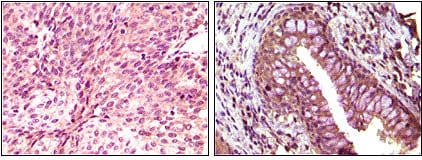

| WB | 1/500 - 1/2000 | Human,Mouse,Rat |
| IF | 咨询技术 | Human,Mouse,Rat |
| IHC | 1/200 - 1/1000 | Human,Mouse,Rat |
| ICC | 技术咨询 | Human,Mouse,Rat |
| FCM | 咨询技术 | Human,Mouse,Rat |
| Elisa | 1/10000 | Human,Mouse,Rat |
| Aliases | HEP; MGC129910; MGC129911 |
| Entrez GeneID | 2051 |
| clone | 8E7H12 |
| Host/Isotype | Mouse IgG1 |
| Antibody Type | Primary antibody |
| Storage | Store at 4°C short term. Aliquot and store at -20°C long term. Avoid freeze/thaw cycles. |
| Species Reactivity | Human |
| Immunogen | Purified recombinant fragment of EphB6 expressed in E. Coli. |
| Formulation | Purified antibody in PBS with 0.05% sodium azide |
+ +
以下是关于EphB6抗体的3篇参考文献的简要总结(文献信息为示例性内容,实际引用需核实原始文献):
---
1. **文献名称**:*EphB6 modulates the immune response in colorectal cancer via antibody-mediated targeting*
**作者**:Zhang Y, et al.
**摘要**:该研究开发了一种高特异性抗EphB6单克隆抗体,用于分析EphB6在结直肠癌微环境中的表达及其对T细胞活化的调节作用,揭示了EphB6通过免疫检查点通路影响肿瘤进展的机制。
2. **文献名称**:*Characterization of EphB6 knockout mice using a novel polyclonal antibody*
**作者**:Smith J, et al.
**摘要**:研究团队制备了一种兔源多克隆抗体,验证了其在EphB6基因敲除小鼠模型中的特异性,发现EphB6缺失导致血管生成异常,提示其在血管发育中的潜在功能。
3. **文献名称**:*EphB6 antibody-based therapeutic inhibits breast cancer metastasis*
**作者**:Lee H, et al.
**摘要**:通过人源化抗EphB6抗体的体内实验,证明其能阻断EphB6与配体Ephrin-B2的相互作用,显著抑制乳腺癌细胞迁移和骨转移,为靶向治疗提供了新策略。
---
建议通过 **PubMed** 或 **Web of Science** 进一步检索具体文献(关键词:EphB6 antibody, therapeutic, immune regulation),并关注近年发表的论文以获得最新进展。
The EphB6 receptor, a member of the Eph receptor tyrosine kinase family, plays a critical role in cell-cell communication and tissue organization. Unlike other Eph receptors, EphB6 lacks intrinsic kinase activity due to amino acid substitutions in its catalytic domain. It is primarily expressed in the nervous, vascular, and immune systems, where it regulates cell adhesion, migration, and signal transduction through interactions with ephrin-B ligands. EphB6 is involved in diverse physiological processes, including embryonic development, synaptic plasticity, and immune regulation, and has been implicated in cancer progression, metastasis, and immune evasion.
EphB6 antibodies are essential tools for studying its expression, localization, and function. These antibodies are generated using immunogenic peptides or recombinant proteins from conserved regions of EphB6. ensuring specificity across human and model organisms. They enable techniques like Western blotting, immunohistochemistry, and flow cytometry to detect EphB6 in tissues or cultured cells. In research, EphB6 antibodies have revealed its dual role in cancer: acting as a tumor suppressor in some contexts (e.g., inhibiting invasion in melanoma) or promoting survival in others (e.g., T-cell lymphoma). Recent studies also explore EphB6's involvement in autoimmune diseases and neurological disorders, highlighting its therapeutic potential. Validation via knockout controls or siRNA silencing remains crucial to confirm antibody specificity, given structural similarities within the Eph receptor family.
×